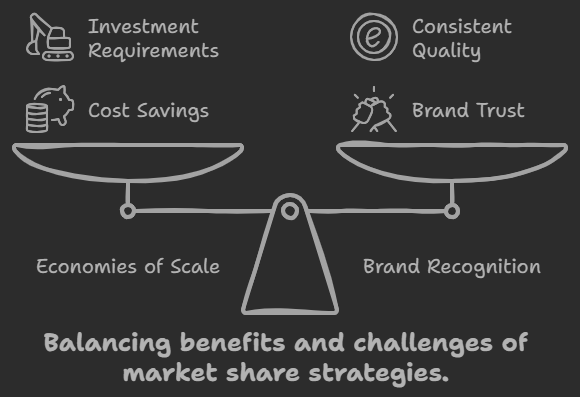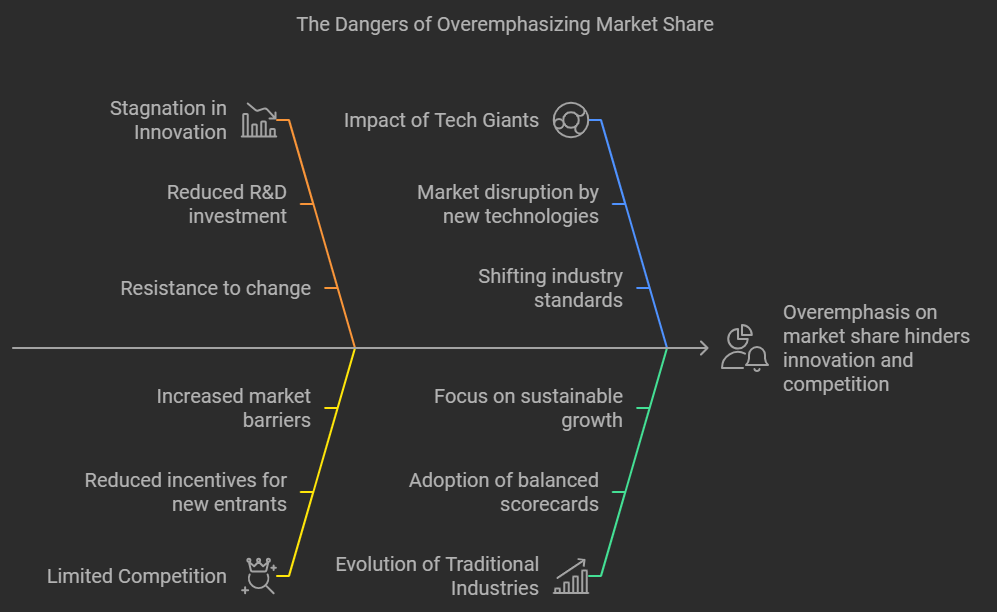Market Share: Is It Good or Can It Be Bad?
Market share is a term used in business discussions. It refers to the portion of company sales compared to the total market. But is a large market share always positive, or can it come with drawbacks?
In this article, we’ll look at the advantages and disadvantages of market share and its impact on businesses and consumers. Understanding market share is important for making informed marketplace decisions.
Understanding Market Share
Definition of Market Share
Market share is the portion of sales a company holds in its industry. To calculate it, divide the company’s total sales by the industry’s total sales and multiply by 100 for the percentage.
This provides insight into the company’s size and strength compared to rivals. Understanding this helps companies identify areas where they may lag or excel.
Market share has implications for strategic decisions, guiding competitive positioning, pricing, product development, and resource allocation.
However, the blog emphasizes that market share shouldn’t be the sole focus. Prioritizing profitability over market share alone is crucial for long-term success.
Key Business Metrics Involving Market Share
Market share shows how competitive a company is in an industry. It’s the amount or percentage of total sales a brand or company has compared to others. While having a high market share is good, it doesn’t always mean the company is profitable or successful. Market share is a key way for companies to measure their performance and position in the industry.
But many other things affect how well a company does, like what customers want, how they shop, what competitors do, and changes in the market. Having a high market share can make a company well-known and give it loyal customers. But, as we’ve seen with Blockbuster and others, focusing only on market share can be wrong and may not mean long-term success. Market share is still important, but using it as the only way to make business plans is risky.
Role of Market Share in Competitive Landscapes
Having a high market share in a competitive market can be risky, as seen with Blockbuster’s decline when Netflix rose. This shows that market share alone doesn’t guarantee success and can be a risky metric. A singular focus on market share can be misleading and harmful to overall profitability. However, a high market share can lead to higher profitability, as shown in the correlation between market share and ROI. Yet, using market share alone as a business metric can be dangerous.
A balanced scorecard approach, including non-financial metrics like customer retention and acquisition cost, can give a more thorough evaluation. This approach prevents market share from being misleading and risky.
Is Market Share Good or Bad?

Having a high market share can lead to negative consequences.
For example, it can cause complacency and decrease innovation and product quality. This can also result in industry stagnation as leading companies may become less responsive to changing consumer needs. Over time, focusing on market share can limit competition and hinder new players and innovative ideas.
Additionally, prioritizing market share may overshadow other important business metrics, like customer satisfaction and long-term profitability. Therefore, businesses should balance market share with other performance indicators for sustainable growth and success.
Pros of a High Market Share

Economies of Scale
Economies of scale in business operations provide many benefits. As production increases, efficiency goes up, resulting in cost savings. Larger companies spread fixed costs over higher volumes, reducing average unit costs. Economies of scale also bring increased bargaining power with suppliers, access to capital, and potential market dominance.
However, achieving economies of scale is challenging and requires significant investment in technology, infrastructure, and workforce development. It greatly influences a company’s market share and competitive position. Successful implementation can lead to increased market share, revenue, and the ability to lower prices to outperform competitors.
On the other hand, pursuing economies of scale may lead to rigidity, decreased agility, and a lack of product differentiation focus, all detrimental in today’s dynamic business environment. Therefore, while economies of scale offer advantages, companies must carefully evaluate potential drawbacks and challenges before pursuing this strategy.
Brand Recognition and Customer Loyalty
Brand recognition is significant for customer loyalty. When customers know and trust a brand, they are likelier to stay loyal and keep buying its products or services. A strong brand identity creates reliability, quality, and consistency, which are important for building a loyal customer base.
Businesses can use different strategies to build and maintain customer loyalty through brand recognition. They can provide excellent customer service, create unique brand messaging, and offer rewards to repeat customers.
Brand recognition also helps determine market share and competitive advantage. A well-known and respected brand will likely capture a larger portion of the market and attract and retain customers more effectively than lesser-known competitors. This gives the brand a competitive edge and contributes to its overall success in the market.
Influence over the Market
High market share can greatly impact a company’s position in the market. Companies with a large market share often profit more than those with smaller shares. However, solely focusing on gaining market share can harm a company’s success. This was evident in the case of Blockbuster, which faced a downfall when Netflix introduced a new business model. A heavy focus on market share growth can hinder innovation and lead to complacency.
It also gives an incomplete understanding of a company’s overall performance.
Additionally, solely focusing on market share doesn’t guarantee long-term profitability and growth. Therefore, companies need to take a balanced approach. They should consider other key performance indicators such as customer sentiment, experience, and brand health. This balanced approach ensures a comprehensive understanding of business performance and long-term success in the market.
Negative Aspects of Market Dominance
Potential for Antitrust Issues
A high market share can create antitrust issues. This happens when a company has a lot of control over a market and acts in ways that limit fair competition, like fixing prices or excluding others. To avoid this, a company should focus on innovation and competitive strategies that help consumers.
Being complacent and not innovating when dominating a market can lead to negative outcomes, like losing consumer interest, changing market trends, and facing new competitors. So, companies need to adapt to what consumers want and new technology instead of just relying on market share for success.
Risks of Complacency and Lack of Innovation
Focusing solely on maintaining or increasing market share can be risky for businesses. It can lead to complacency and a lack of innovation, discouraging companies from seeking new products and processes. This can hinder long-term innovation and competition within an industry. By prioritizing market share over adaptation and creativity, businesses risk becoming irrelevant or obsolete in changing consumer demands and technological advancements.
Overemphasizing market share can lead to missed opportunities for growth and profitability, as seen in the failure of companies like Blockbuster to innovate in response to Netflix’s new business model. Therefore, a balanced approach to metrics, including market share, is important. Businesses should prioritize innovation and adaptation to ensure long-term success.
Market Share as a Business Metric: Balance and Context
Market Share Versus Profitability
A high market share can help companies be more visible and earn customer loyalty. However, focusing only on market share can lead to prioritizing short-term gains over long-term success. Spending too much on gaining market share might mean neglecting product quality, customer satisfaction, and cost-efficiency, which can hurt profits.
Focusing too much on market share might make companies overlook other important factors like innovation, efficiency, and customer-centered strategies. This can cause them to miss out on long-term growth and success.
The blog suggests not relying solely on market share to measure success. It recommends using a variety of performance indicators for a balanced approach.
Market Share Myths in Business Strategy
Market share is often seen as the main measure of business success. But Blockbuster’s downfall against Netflix shows that this can be misleading.
The blog highlights the potential danger of focusing too much on market share. It suggests that a balanced approach with other metrics, like brand health and customer experience, is more reliable for long-term success.
The text emphasizes that prioritizing market share could harm a company’s innovation and competitiveness. It uses examples and studies to support this idea.
Beyond Market Share: Comprehensive Business Performance
Diversification of Metrics – Beyond Market Share
Market share is important for business profitability. But other metrics matter, too.
Focusing only on market share can harm long-term innovation and competition. It might lead to a short-term focus and discourage risk-taking.
Real-life examples show how market disruption and changes in market share can impact businesses. For instance, the decline of Blockbuster and the rise of Netflix.
Rhea + Kaiser marketing agency says a balanced scorecard approach is crucial. This includes non-financial measures like brand health and customer sentiment. This approach differs from the old belief that market share alone determines growth and profitability.
Is Focusing Solely on Market Share Dangerous?

The Harm of Overemphasizing Market Share
Overemphasizing market share can negatively impact innovation and competition in an industry. Companies focused solely on increasing market share may overlook investing in research and development or adapting to changing consumer trends, leading to stagnation in innovation. As shown by Blockbuster’s downfall when Netflix disrupted the video rental market, tech giants hyper-focused on market share can hinder innovation and block new entrants.
In traditional industries, prioritizing market share can lead to resistance to change and hinder adaptation to new market dynamics, ultimately resulting in decline. Overemphasizing market share inhibits innovation and adaptability in a rapidly evolving market.
Long-Term Impact on Innovation and Competition
Market dominance can stifle innovation and limit competition in the long run. When a brand gains a significant market share, it reduces the incentives to invest in research and development.
Focusing on maintaining market share can lead to stagnation and resistance to change, hindering industry evolution.
Tech giants like Amazon, Google, and Apple have disrupted traditional markets, challenging established brands. Their innovative approach and large market share have altered industry dynamics and reshaped the concept of market dominance.
With their strong influence, these companies have the power to shift market trends, forcing traditional competitors to adapt to remain relevant.
Therefore, market share should not be the sole focus, as it can hinder the progress of innovation and limit healthy competition in the long term.
Tech Giants and Market Disruption
Tech giants are known for changing traditional industries and affecting market share. They introduce new technologies and business models that can dominate markets and reshape whole industries. This can threaten established companies but also create opportunities for new players and entrepreneurs. The potential risks and benefits of tech giants having a high market share in various industries are significant.
High market share can increase profitability and give tech giants the power to set industry standards. However, it can also limit competition, restrict consumer choice, and make it hard for smaller firms to enter the market. Market share greatly impacts the competitive landscape of tech giants, affecting brand performance, customer acquisition, and shareholder value. Their strategic decisions and investments are influenced by market share, which investors and analysts closely watch for its impact on financial performance.
Traditional Industries and the Evolution of Market Share
Market share has changed in traditional industries over time. It was once seen as crucial for business profits, but now we know it’s not enough for success. Many things affect market share in traditional industries, like consumer trends, tech progress, and new business models. So, these industries have had to change how they measure success.
They now use a balanced scorecard to check their performance, which includes non-financial factors like brand health, consumer sentiment, and customer experience alongside market share. This helps them see if their marketing is working and prevents them from focusing only on market share. Now, they can focus on making profits and growing sustainably instead of just aiming for a big market share.

Vizologi is a revolutionary AI-generated business strategy tool that offers its users access to advanced features to create and refine start-up ideas quickly.
It generates limitless business ideas, gains insights on markets and competitors, and automates business plan creation.


